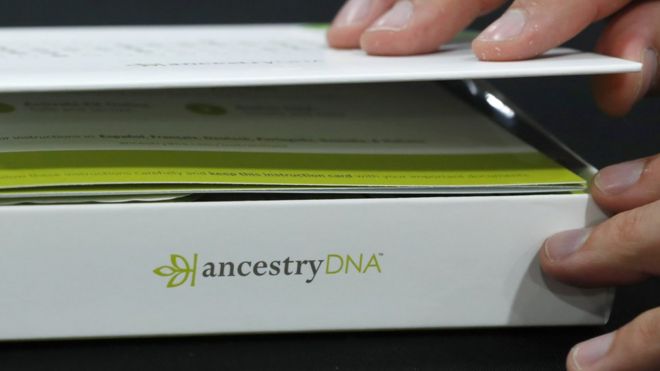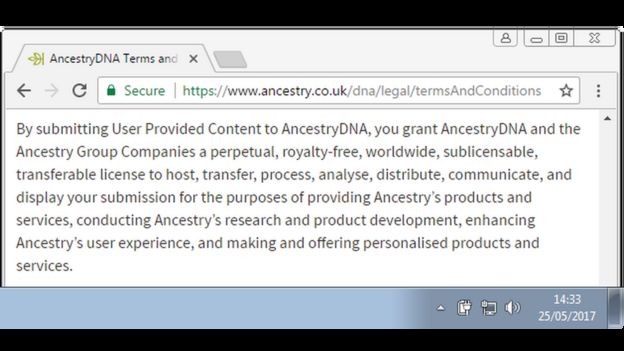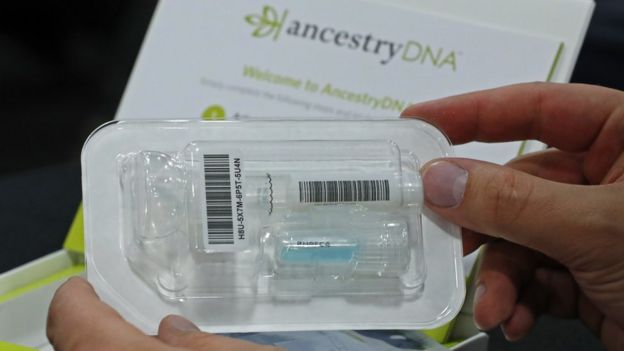Ancestry.com denies exploiting users' DNA


By Harry Kretchmer-25 May 2017
A leading genealogy service, Ancestry.com, has denied exploiting users' DNA following criticism of its terms and conditions.
The US company's DNA testing service has included a right to grant Ancestry a "perpetual" licence to use customers' genetic material.
A New York data protection lawyer spotted the clause and published a blogwarning about privacy implications.
Ancestry told BBC Radio 4's You and Yours its terms were being changed.
Headquartered in Utah, Ancestry is among the world's largest for-profit genealogy firms, with a DNA testing service available in more than 30 countries.
'Perpetual'
The company, which uses customers' saliva samples to predict their genetic ethnicity and find new family connections, claims to have more than 4 million DNA profiles in its database.
Ancestry also stores the profiles forever, unless users ask for them to be destroyed.
 AncestryDNA told the BBC it would be removing the 'perpetuity clause' from its terms and conditions - still present at the time of writing
AncestryDNA told the BBC it would be removing the 'perpetuity clause' from its terms and conditions - still present at the time of writing
The company's terms and conditions have stated that users grant the company a "perpetual, royalty-free, worldwide, sublicensable, transferable license" to their DNA data, for purposes including "personalised products and services".
In a statement to You and Yours, an Ancestry spokesperson said the company "never takes ownership of a customer's data" and would "remove the perpetuity clause".
It added: "We will honour our commitment to delete user data or destroy their DNA sample if they request it. The user is in control."
'Unaware'
Joel Winston, a consumer rights lawyer and former New Jersey State deputy attorney-general, was one of the first to spot the legal wording and to warn of the possible implications.
"Ancestry.com takes ownership of your DNA forever; your ownership of your DNA, on the other hand, is limited in years," he said.
He added: "How many people really read those contracts before clicking to agree? How many relatives of Ancestry.com customers are also reading?"
 More than 4 million customers worldwide have used AncestryDNA, which requires users to send a saliva sample for testing
More than 4 million customers worldwide have used AncestryDNA, which requires users to send a saliva sample for testing
In its terms and conditions Ancestry makes reference to "commercial products that may be developed by AncestryDNA using your genetic information".
One customer, Richard Peace, used AncestryDNA to learn more about his family history.
'Not happy'
He told You and Yours he "knew nothing" about the commercial use when he signed up for the test.
"I'm not happy about it and today I will be emailing them to ask them not to use the information," he said.
Ancestry told the BBC: "We do not share user data for research unless the user has voluntarily opted-in to that sharing."
The company added: "We always de-identify data before it's shared with researchers, meaning the data is stripped of any information that could tie it back to its owner."
The ambitious scale of Ancestry's plans does have support among some academics.
Debbie Kennett, a genetics researcher at University College London, welcomed the aim of building a large, global DNA database.
"For genealogy purposes we really want, and rely on, the power of these large data sets," she told You and Yours. "A DNA test on its own doesn't tell you anything at all."
You and Yours is on BBC Radio 4 weekdays 12:15-13:00 GMT. Listen online or download the programme podcast.
